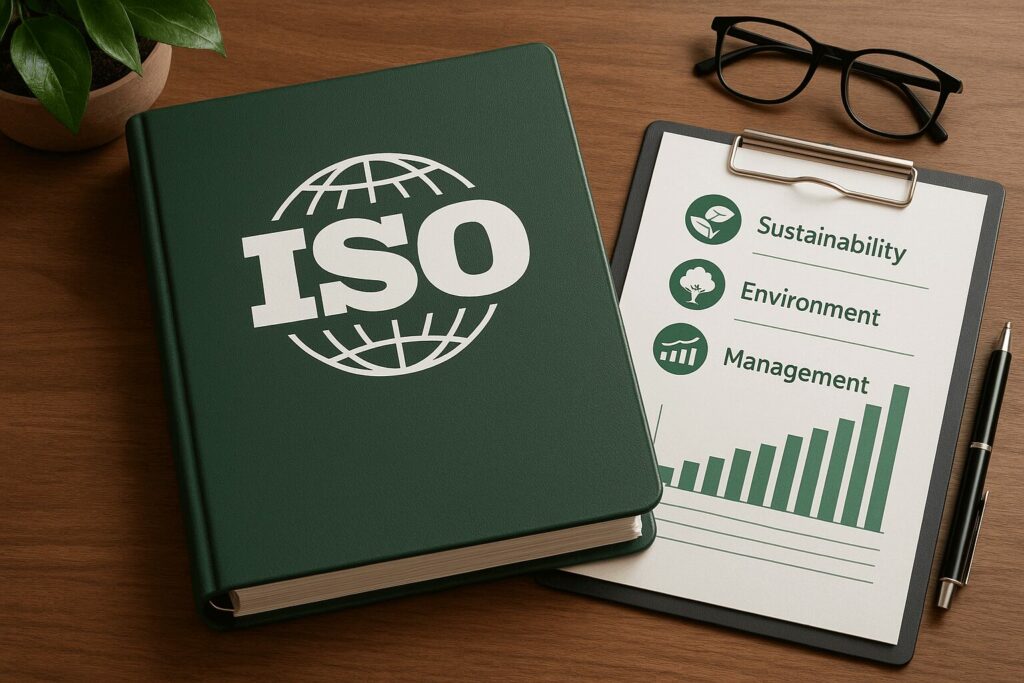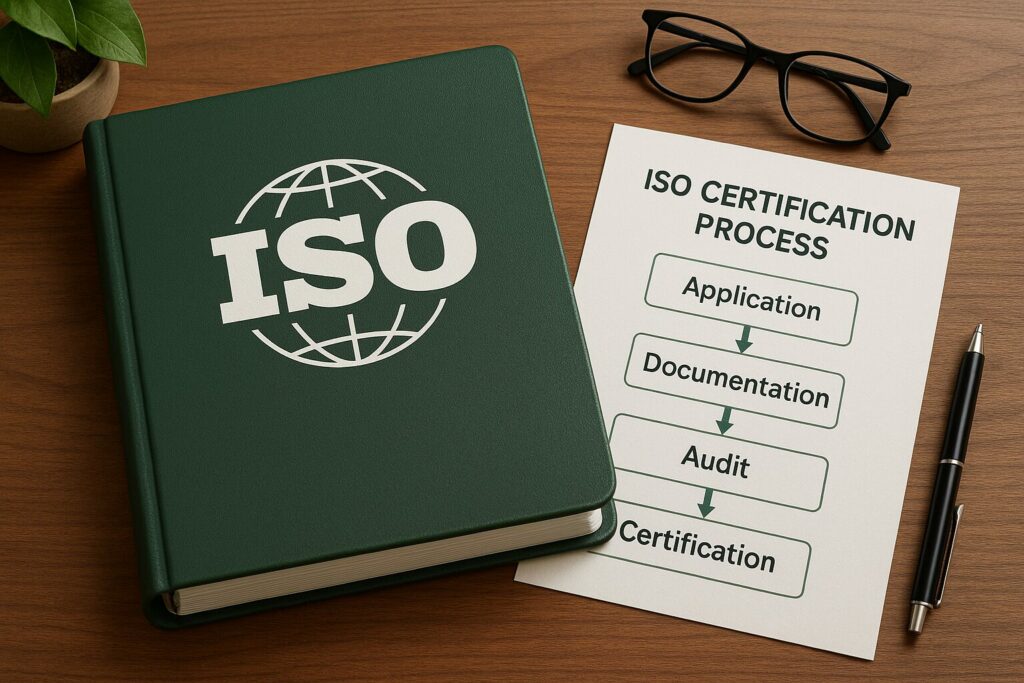
Iso Certification for Sustainability: Cut Costs & Build Trust 🌱
Already heard about ISO certification for sustainability? Is it another type of green certification? 🌱 Let’s go deeper into this topic! This article breaks down how ISO sustainability certification helps businesses align with ESG frameworks, meet regulations like ESRS / CSRD, and prove their commitment through standards like ISO 14001 and ISO 9001 sustainability. We’ll walk you through actionable steps, real-world examples, and why these certifications are more than just badges—they’re tools to reduce environmental impact, boost trust, and future-proof your operations. Ready to turn buzzwords into real results? 🌍
ISO Certification for Sustainability: Practical Guide Article Takeaways
ISO sustainability standards offer a practical, globally recognized way for hospitality businesses to improve ESG performance and reduce operational risks. Certifications like ISO 14001 (environment), ISO 50001 (energy), and ISO 21401 (sustainable tourism) drive measurable results—from cutting energy costs to minimizing plastic waste. These frameworks help align operations with international regulations and investor expectations, while boosting brand credibility. With over 500,000 certifications issued, ISO is more than compliance—it’s a tool for long-term competitive advantage. The process is structured, auditable, and adaptable to industry-specific needs.
Table of contents
- Understanding ISO Sustainability Certification Framework
- Key ISO Standards for Sustainable Business Practices
- Benefits of ISO Sustainability Certification
- Implementing ISO Standards for Sustainable Performance
Understanding ISO Certification for Sustainability in Hospitality Framework
Unlike some local Sustainable Tourism Certification, ISO sustainability certifications are international benchmarks helping organizations, achieving operational excellence, meeting legal requirements, and satisfying stakeholder expectations. ISO standards are even more recognized worldwide than international certifications such as Green Globe Certification or Green Key for Hotels. These standards provide actionable frameworks to measure hidden costs, improve transparency, and reduce environmental impacts. For example, ISO 14001 sets criteria for environmental management systems (EMS), enabling businesses to minimize their ecological footprint while aligning with global sustainability goals. The ISO’s environmental standards emphasize measurable outcomes, ensuring companies remain compliant and competitive in today’s eco-conscious market. 🌍
ISO standards cover the three pillars of sustainability: environmental, social, and governance (ESG). They define what to monitor (climate action, labor practices, ethics) and how to act. For instance, ISO 14001 tackles environmental stewardship, while ISO 26000 guides social responsibility. With over 500,000 ISO 14001 certifications globally, these frameworks ensure businesses address ESG gaps systematically. The upcoming ISO/WD 53001 will even align with UN Sustainable Development Goals (SDGs), proving ISO’s role in shaping a holistic, future-ready sustainability strategy. 🌱
| ISO Standard | Focus Area | Key Benefits |
|---|---|---|
| ISO 14001 | Environmental Management | Over 300,000 organizations certified globally. Reduces environmental impact through systematic resource management. Improves legal compliance and operational efficiency. |
| ISO 26000 | Social Responsibility | Guidelines for integrating ethical practices. Enhances community engagement and long-term organizational resilience. |
| ISO 50001 | Energy Management | Up to 30% energy cost reduction reported by adopters. Supports climate action through improved energy efficiency. |
| ISO 45001 | Occupational Health & Safety | 22% decrease in workplace incidents over 5 years. Protects employee well-being and reduces operational risks. |
| ISO 37001 | Anti-Bribery Management | Prevents corruption through policy frameworks. Strengthens governance and stakeholder trust. |
| ISO 27001 | Information Security | Protects sensitive data with confidentiality measures. Ensures compliance with digital security regulations. |
| ISO 14064 | Greenhouse Gas Reporting | Standardized carbon footprint measurement. Essential for ESRS compliance and climate transparency. |
| ISO 21401 | Sustainable Tourism | Improves hotel reputation and supply chain sustainability. Aligns with global hospitality ESG goals. |
| ISO 46001 | Water Efficiency | Optimizes water usage through monitoring systems. Supports clean water sanitation targets. |
| ISO/WD 53001 | United Nations SDGs | In development. Will standardize ESG integration for all 17 UN Sustainable Development Goals. |
Key ISO Standards for Sustainable Business Practices
ISO 14001 isn’t just paperwork—it’s a game-changer for environmental management. 🌿 This international standard helps organizations cut pollution, track carbon footprints, and meet legal requirements. Take Hilton Hotels: they saved over $1 billion in energy costs between 2008-2018 by implementing ISO 14001. With more than 300,000 certifications globally, it’s clear this framework works. From waste reduction to resource efficiency, ISO 14001 turns good intentions into measurable environmental action. Over 500,000 certifications across 180+ countries prove its universal appeal.
Here’s a quick guide to ISO standards:
- ISO 14001 (Environmental Management Systems): Cuts pollution, tracks carbon footprints, and meets legal requirements
- ISO 45001 (Occupational Health and Safety): Lowers workplace injuries by 22% over five years while protecting employee wellbeing
- ISO 26000 (Social Responsibility): Builds community trust through ethical practices and stakeholder engagement
- ISO 20400 (Sustainable Procurement): Transforms supply chains with eco-friendly sourcing and ethical supplier management
- ISO 50001 (Energy Management): Boosts energy efficiency—some companies report 30% cost reductions
- ISO 37001 (Anti-Bribery Systems): Fights corruption while building investor confidence
- ISO 27001 (Information Security): Secures sustainability data and meets digital compliance needs
- ISO 14064 (GHG Management): Standardizes carbon accounting for transparent climate reporting
- PDCA Cycle: Drives continuous improvement in environmental, social, and governance practices
- 17% Growth: Shows rising adoption of sustainability standards since 2019 across industries
ISO 26000 and ISO 50001 tackle two critical sustainability angles. 🌟 While ISO 26000 isn’t certifiable, it pushes companies to act ethically—covering human rights, labor practices, and community engagement. Think of French winemakers using it to future-proof their businesses. Meanwhile, ISO 50001 delivers concrete energy savings: adopters regularly cut costs by 30%. Together, they create a powerful combo—ISO 26000 builds trust through social responsibility frameworks, while ISO 50001 slashes energy bills and climate impact. Win-win? 🔋

Benefits of ISO Sustainability Certification
ISO sustainability certifications deliver operational excellence, legal compliance, and stakeholder trust. Certified companies cut costs through energy efficiency (e.g., 30% reductions with ISO 50001) and waste minimization (ISO 14001). These standards future-proof businesses while aligning with ESG frameworks and global sustainability goals. 🌱
Environmental and business advantages of ISO certification for sustainability:
- Resource efficiency: ISO 14001 reduces water/electricity use by 22% through systematic monitoring
- Carbon footprint reduction: ISO 14064-1 standardizes greenhouse gas reporting for ESRS compliance
- Waste minimization: Hotels using ISO 21401 report 40% less single-use plastics in operations
- Regulatory compliance: Frameworks like ISO 46001 ensure adherence to clean water sanitation targets (SDG 6)
- Climate resilience: Energy management systems (ISO 50001) cut carbon emissions by 25% on average
- Cost savings: 30% energy bill reductions reported by ISO 50001 adopters
- Investor appeal: 65% of institutional investors prioritize companies with verified ISO sustainability claims
- Brand reputation: Certified organizations see 20% higher customer loyalty scores
- Market differentiation: ISO 26000 improves CSR reporting, attracting ESG-conscious clients
- Supply chain improvements: ISO 20400 ensures 100% sustainable procurement in certified hospitality groups
ISO standards align with ESRS/CSRD requirements by providing frameworks for environmental, social, and governance (ESG) compliance. ISO 14001 supports climate action (ESRS E1), circular economy (E5), and legal adherence, while ISO 26000 guides stakeholder engagement (S1-S4) and ISO 14064-1 standardizes carbon reporting. 96% of S&P 500 companies now report ESG metrics, showing ISO’s role in regulatory alignment. Certified organizations gain audit readiness and transparent communication structures. 🌍
Implementing ISO Standards for Sustainable Performance
The ISO Certification Process Explained
Getting ISO certification feels like preparing for a mountain hike—plan your route first. Start with a gap analysis to spot weaknesses. Then train your team, document processes, and audit internally. Hire an accredited body for the final check. Most certifications take 6-18 months. ISO 14001 or ISO 9001? Same steps, different focus. Keep climbing toward compliance! 🏔️
Organizations must meet specific management systems requirements. Leadership commitment, risk assessment, and continuous improvement (PDCA cycle) are non-negotiable. ISO standards provide actionable guidance for implementation. For example, ISO 14001 requires environmental impact monitoring. Over 17% more companies adopted these systems since 2019, showing growing importance in sustainable operations. Follow documented procedures—no shortcuts! 📋

Practical Implementation for Hospitality and Other Industries
Hotels face unique ISO challenges: balancing guest comfort with eco-gains. 🏨 ISO 21401 helps hospitality businesses reduce single-use plastics and optimize energy use. For manufacturing, ISO 50001 slashes factory energy costs. Tailor standards to industry pain points—no one-size-fits-all here. Global goals demand local solutions. 🌍
Real-world wins exist! Hilton cut $1B in energy costs using ISO 14001. French vineyards improved soil health through ISO 26000’s social responsibility framework. The Meurice Paris Hotel boosted guest loyalty by 20% after ISO 21401 certification. These organizations didn’t just check boxes—they embedded sustainability into operations. From waste reduction to community engagement, ISO standards deliver measurable impact. 📈
Avoid greenwashing by anchoring claims in ISO frameworks. 🌱 ISO 14001 requires documented systems with verified performance data. Third-party audits prevent vague « eco-friendly » claims. Track energy savings, waste reduction, and supply chain ethics with ISO 20400. Transparency builds trust—no short cuts. Let standards prove your sustainability story. 📊
An ISO certification for sustainability isn’t just badges—it’s a blueprint 🌱 for ESG progress. By adopting standards like ISO 14001 or 50001, organizations cut costs, build trust, and future-proof their operations. The clock’s ticking: Start today to turn compliance into competitive advantage tomorrow. 🌍
Q / A About ISO Certification for Sustainability: Practical Guide
Whats is the difference between ISO 14001 et ESG ?
Think of ESG (Environmental, Social, and Governance) as the big picture, like planning a sustainable hotel. It’s a broad framework investors use to check if a company is eco-friendly, treats people well, and is managed ethically. It pushes businesses to do more than just follow the rules, aiming for a positive impact on the planet and society.
Now, ISO 14001 is like the blueprint for building that eco-friendly hotel. It’s a detailed set of instructions for managing your environmental responsibilities, helping you cut waste, save resources, and meet environmental goals. So, ESG is the overall vision, while ISO 14001 is the practical tool to make the environmental part of that vision a reality. 🌍
What is the difference between ISO et LEED ?
Alright, so LEED is all about green buildings, like making sure your hotel is energy-efficient and uses sustainable materials. It’s mainly a US thing, but recognized worldwide. On the other hand, ISO standards are broader, covering everything from how your organization runs to the services you offer. ISO is like the international stamp of approval, ensuring quality, safety, and sustainability across the board.
Think of it this way: LEED is for the building itself, while ISO is for how you manage everything inside and out, ensuring continuous improvement. ISO certifications need regular check-ups, while LEED is more of a one-time achievement, though there’s a separate certification for keeping the building running sustainably. 🏨
What is ISO 26000 certification ?
ISO 26000 is your go-to guide for social responsibility. It’s not a certification you can get, but rather a set of guidelines to help organizations of all sizes act ethically and responsibly. It’s like having a moral compass for your business, covering everything from human rights to fair labor practices and community engagement. 🌱
This standard helps you understand and put social responsibility principles into action. It focuses on making a real impact and constantly improving your performance in areas like governance, human rights, and environmental stewardship. Consider it a framework for building trust and making a positive contribution to society. 👍
Is ISO certification interesting ?
Absolutely! ISO certification is generally a solid investment. It’s like getting a seal of approval that shows you’re serious about quality, efficiency, and sustainability. ISO standards help you streamline operations, meet legal requirements, and keep your stakeholders happy, proving that you care about running a responsible and efficient business.
Certified companies often see boosts in productivity, customer satisfaction, and even revenue. It also helps you break into new markets and keeps your team engaged. A UN survey showed that 98% of ISO-certified companies consider it a good investment, so it’s definitely worth considering! 💰
What is the best ISO certification for sustainability ?
Well, there’s no one-size-fits-all answer here. The « best » sustainability certification really depends on what you’re trying to achieve. However, several ISO standards are super relevant for organizations looking to boost their sustainability performance. For example, ISO 14001 focuses on environmental management, helping you minimize your environmental impact and comply with regulations.
If you’re looking at social responsibility, ISO 26000 provides guidelines, though it’s not certifiable. And for energy management, ISO 50001 can help you improve energy efficiency and cut greenhouse gas emissions. It’s all about picking the right tool for the job! 🎯
What is the difference between ISO 14001 et ISO 20121 ?
Alright, let’s break it down. ISO 14001 is your general environmental management system. It’s like setting up a framework to minimize your environmental footprint across your entire organization. It helps you comply with laws, reduce waste, and continuously improve your environmental performance, no matter what industry you’re in.
Now, ISO 20121 is specifically for sustainable event management. Think of it as a way to plan and execute events with minimal environmental, social, and economic impact. So, if you’re running a hotel, ISO 14001 is for the overall operation, while ISO 20121 is for ensuring your conferences and weddings are as green as possible. 🎉
